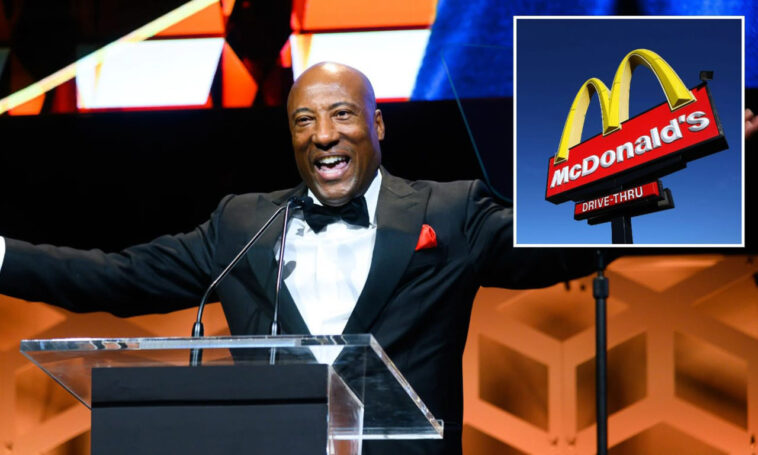A California federal judge has ruled that Byron Allen’s $10 billion racial discrimination lawsuit against McDonald’s can move forward to trial. The lawsuit, filed by the media mogul in 2021, accuses McDonald’s of systematically sidelining his companies, including Entertainment Studios Networks and Weather Group LLC, by allocating a disproportionately small share of its advertising budget to Black owned media outlets. The ruling from U.S. District Judge Fernando M. Olguin marks a significant legal step in a case that highlights allegations of racial discrimination within the corporate world.
Judge Olguin described the decision as a “close call,” acknowledging that Allen’s claims of racial stereotyping, particularly regarding McDonald’s advertising practices, are best suited for a jury to resolve.
In his 25-page ruling, Olguin stated that the court was within its discretion to deny McDonald’s motion to dismiss the case, emphasizing that a full trial would better serve to examine the merits of Allen’s allegations. The judge remarked that, despite McDonald’s legal team’s attempts to dismiss the case at this stage, the evidence warrants a deeper judicial inquiry.
Allen’s lawsuit claims that McDonald’s violated both federal and California civil rights laws by relegating his media networks to a separate “African American tier” for advertising purposes. This tier allegedly operated with a much smaller advertising budget and was managed by a different agency, specifically focused on Black audiences. The lawsuit asserts that McDonald’s relegated Allen’s networks to this tier solely because of his race, depriving them of millions of dollars in potential advertising revenue.
The complaint also underscores the disparity between McDonald’s public stance on diversity and inclusion and its actual advertising practices. Allen argues that McDonald’s, despite publicly touting its commitment to diversity, has spent a shockingly small amount of its advertising budget on Black-owned media less than $5 million of its $1.6 billion advertising budget in 2019, despite the fact that Black consumers represent about 40% of the company’s customer base. Allen and his companies argue that this shows the fast-food giant’s alleged commitment to diversity is little more than “empty rhetoric.”
According to Allen, McDonald’s refusal to work directly with his companies, despite his extensive reach in the media industry, is part of a larger pattern of racial discrimination that has also been evidenced by the company’s treatment of Black executives and franchisees. The lawsuit includes reference to various racial discrimination complaints that have been made against McDonald’s in the past, including allegations from Black executives and franchisees, as well as a high-profile incident involving the company’s CEO, Chris Kempczinski, who faced public scrutiny for racist text messages.
In response to the judge’s ruling, McDonald’s issued a statement expressing confidence that the case is “utterly baseless” and will ultimately be dismissed. The company maintains that its advertising decisions are made based on business logic, not racial bias. According to McDonald’s, investments in media properties are determined by their alignment with the company’s overall business strategy, audience reach, and ratings, and it claims that Allen’s networks did not meet these criteria. The company also emphasized that it has continued to invest in diverse media outlets, including efforts to increase its advertising spend on Black owned media, in line with its announced goal of raising its Black media spending to 5% by 2024.
This legal battle highlights a broader conversation about racial equity in corporate America, especially in terms of how businesses allocate advertising dollars. It reflects the larger national dialogue on diversity, inclusion, and corporate responsibility, and it underscores the ongoing challenges faced by Black entrepreneurs in the media and entertainment industries. As the case heads toward trial, it is poised to be a significant moment in the fight for racial equity and representation in corporate America.
Byron Allen, who has long been an advocate for minority media representation, has remained outspoken about his efforts to hold McDonald’s accountable. He continues to argue that the company’s practices have not only harmed his business but also contributed to the wider systemic inequities faced by Black-owned media companies. The outcome of the case could have far-reaching implications for how major corporations engage with diverse media outlets and how they are held accountable for their advertising and business practices in a rapidly changing cultural landscape.






Join the Community and Be a Part of the Conversation
You must be logged in or registered to post a comment.